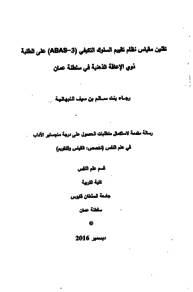وثيقة
تقنين مقياس نظام تقييم السلوك التكيفي (ABAS-3) على الطلبة ذوي الإعاقة الذهنية في سلطنة عمان
الناشر
جامعة السلطان قابوس
ميلادي
2016
اللغة
العربية
الموضوع
الملخص الإنجليزي
The study aimed to standardize the Arabic version (translated by the researcher) of the of the Adaptive Behavior Assessment System (ABAS-3) teachers' form identify the psychometric properties and the norms for Omani Students with mild and moderate intellectual disabilities.
The sample consisted of (410) male and female students from Al Fikriya School in Muscat and from mainstream schools in the governorates of Muscat, Al Batinah, Al Sharqiya, Al Dakhilia; and Al Wusta. The descriptive method was used in the study and the researcher used appropriate statistical techniques to answer the research questions. The findings of the psychometric properties illustrated the scale suitability to the Omani environment and thus its applicability to be used to diagnose intellectual disabilities cases. Three methods were used to identify the scale validity: face validity, discriminatory validity and concurrent validity. Face validity showed the appropriateness of the scale items to the Omani context. While the discriminatory validity results showed the ability of the scale to discriminate between normal and intellectual disable students. Furthermore, the calculation of the concurrent validity revealed statistically significant results with the correlation coefficient of (0.807).
Inter-rater reliability, internal consistency, and test-retest were used to calculate the reliability of the scale. The correlation coefficient between teacher's grades and parent's grades was (0.966); internal consistency of Cronbach's Alpha was (0.992); while test-retest produced the correlation coefficient of (0.969), these results indicated that the scale is highly reliable. Moreover, the means differences analyses using One Way ANOVA revealed significant differences among the age group of the sample. Thus the norms for the sample of the study were obtained using percentile ranks based on the age group. The study ended by some suggestions and recommendations based on the researcher's findings.
المجموعة
URL المصدر
الملخص العربي
هدفت هذه الدراسة إلى تحديد الخصائص السيكومترية لمقياس نظام تقييم السلوك التكيفي (3-ABAS) نسخة المعلم المعربة من قبل الباحثة) وتقنينه على البيئة العمانية الاستخلاص المعايير على طلبة ذوي الإعاقة الذهنية البسيطة والمتوسطة في محافظات سلطنة عمان التالية: مسقط، الباطنة، الشرقية، الداخلية، الوسطى. بلغت عينة الدراسة (410) طالب وطالبة من المدرسة الفكرية بمسقط ومدارس دمج الطلاب ذوي الإعاقة الذهنية. حيث تم اتباع المنهج الوصفي، واستخدمت الباحثة الأساليب الإحصائية المناسبة للإجابة على أسئلة الدراسة. وقد دلت نتائج الخصائص السيكومترية للمقياس صلاحيته للبيئة العمانية وملائمته لتشخيص المعاقين ذهنيا في ضوء المعايير التي توفرت في الصورة العمانية من المقياس.
بالنسبة لصدق المقياس فقد تم التحقق منه باستخدام ثلاث طرق هي: الصدق الظاهري والصدق المرتبط بمحك والصدق التمييزي. واشارت نتائج الصدق الظاهري إلى ملائمة فقرات المقياس للبيئة العمانية، كما أظهرت نتائج الصدق التمييزي قدرة المقياس في التمييز بين الأسوياء والأفراد ذوي الإعاقة الذهنية حيث كانت النتائج دالة إحصائية لصالح الأسوياء. وتم التحقق من الصدق التلازمي باستخدام اختبار رافن للمصفوفات المتتابعة كمحك حيث كانت النتائج دالة إحصائية وبلغ معامل الإرتباط ( 0, 807).
بالنسبة للثبات فقط تم التحقق منه بطريقة ثبات الفاحصين، والإتساق الداخلي، وإعادة التطبيق. وقد بلغ معامل الإرتباط بين درجات المعلم ودرجات ولي الأمر ( 966, 0)، وبلغ معامل ألفا كرونباخ ( 992, 0)، في حين بلغ معامل الإرتباط بين التطبيقين ( 969, 0) وهي مؤشرات ثبات عالية.
بعد التحقق من الخصائص السيكومترية للمقياس تم استخراج الرتب المئينية للدرجات الخام لكل فئة عمرية وذلك بعدما أظهرت نتائج التباين الأحادي فروق ذات دلالة إحصائية وفقا المتغير العمر. إنتهت الدراسة ببعض الباحثة من الدراسة المقترحات والتوصيات بناء على النتائج التي حصلت عليها.
بالنسبة لصدق المقياس فقد تم التحقق منه باستخدام ثلاث طرق هي: الصدق الظاهري والصدق المرتبط بمحك والصدق التمييزي. واشارت نتائج الصدق الظاهري إلى ملائمة فقرات المقياس للبيئة العمانية، كما أظهرت نتائج الصدق التمييزي قدرة المقياس في التمييز بين الأسوياء والأفراد ذوي الإعاقة الذهنية حيث كانت النتائج دالة إحصائية لصالح الأسوياء. وتم التحقق من الصدق التلازمي باستخدام اختبار رافن للمصفوفات المتتابعة كمحك حيث كانت النتائج دالة إحصائية وبلغ معامل الإرتباط ( 0, 807).
بالنسبة للثبات فقط تم التحقق منه بطريقة ثبات الفاحصين، والإتساق الداخلي، وإعادة التطبيق. وقد بلغ معامل الإرتباط بين درجات المعلم ودرجات ولي الأمر ( 966, 0)، وبلغ معامل ألفا كرونباخ ( 992, 0)، في حين بلغ معامل الإرتباط بين التطبيقين ( 969, 0) وهي مؤشرات ثبات عالية.
بعد التحقق من الخصائص السيكومترية للمقياس تم استخراج الرتب المئينية للدرجات الخام لكل فئة عمرية وذلك بعدما أظهرت نتائج التباين الأحادي فروق ذات دلالة إحصائية وفقا المتغير العمر. إنتهت الدراسة ببعض الباحثة من الدراسة المقترحات والتوصيات بناء على النتائج التي حصلت عليها.
قالب العنصر
الرسائل والأطروحات الجامعية

